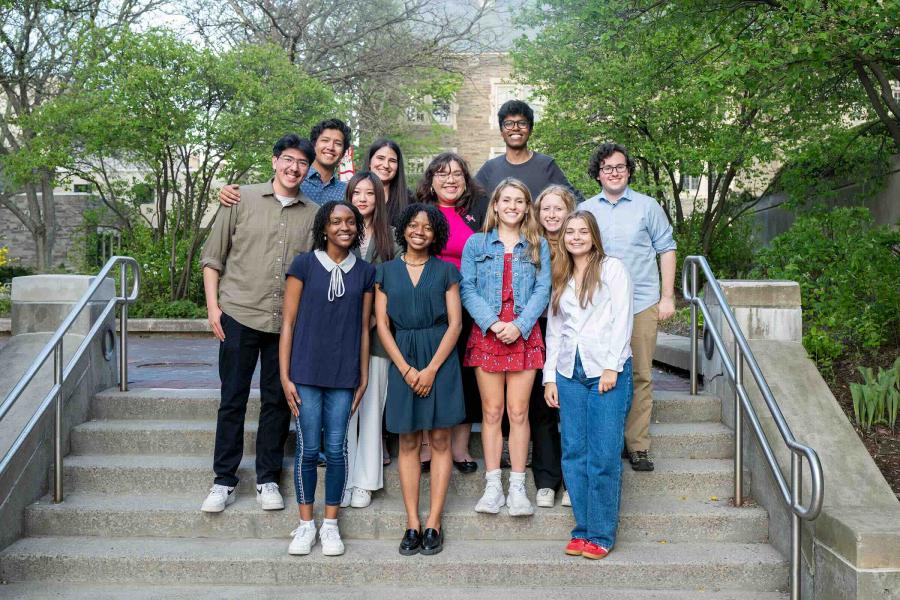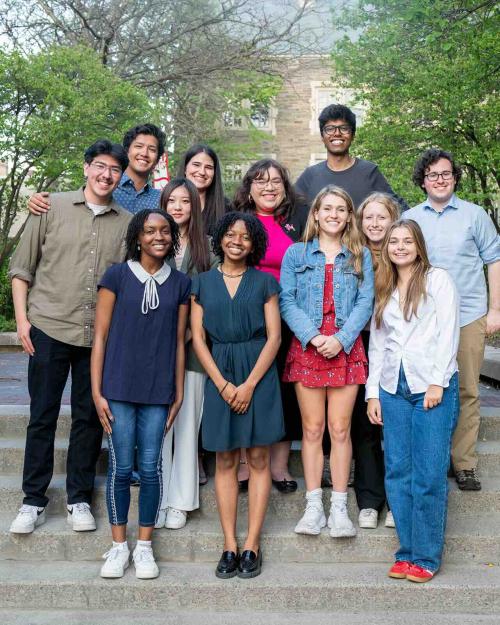Elizabeth Rene ’24 has had an interest in the court system since her high school days watching “Law and Order,” but she became particularly attentive to what was going on in the Supreme Court when Donald Trump became president.
“It was the greatest attack on our democracy and a lot of students my age felt this,” she said. “We started seeing invalidations of landmark precedents, such as Roe vs. Wade, and you don’t see that happening very often in democracies, where you establish a constitutional precedent and then get rid of it.”
That curiosity to understand what was going on in the court, an institution that is supposed to be impartial, sparked Rene to focus on the court for her senior thesis in the Humanities Scholars Program (HSP) in the College of Arts & Sciences (A&S). She presented her work, along with 34 other students at the HSP Spring Research Conference May 3 at the A.D. White House.
“This year’s HSP conference was spectacular. The range of topics covered, the diversity of approaches, and the level of mastery demonstrated by the students were inspiring,” said Lawrence B. Glickman, Stephen and Evalyn Milman Professor of American Studies in the Department of History (A&S) and interim director of the Humanities Scholars Program. “So too was the support that their friends, classmates, and teachers demonstrated with their presence and their questions. It was a marvelous demonstration that humanistic scholarship at Cornell is thriving.”
VerityPlatt, professor of classics (A&S), will take over as HSP director this fall.
“It has been very exciting to see the HSP develop under the inspired leadership of Durba Ghosh and Larry Glickman into a dynamic program that nurtures undergraduate research in the humanities,” she said. “I am honored to be taking on this new role and look forward to working closely with the dedicated, creative, and inspiring students of the HSP.”

At the May event, students covered topics focused on countries around the globe and ranging from immigration, home care workers and female sports culture to the U.S.-China relationship, the repatriation of cultural objects and AI and literature.
Victoria Rinn ’24 used the resources of the Cornell Law Library, as well as an interview with her grandmother, as she compared the way legal language impacts identity politics and freedom of expression in China and Hong Kong.
“I've always been interested in the history of Hong Kong because my family escaped communist China—when Mao Zedong began persecuting the land-owning members of society—to Hong Kong not only because of the economic freedoms but also due to the larger degree of individual autonomy due to its colonial status,” she said. “Following the 2019 National Security Law protests in Hong Kong, I began to question the intersection between legislation and individual expression.”
Rinn, who plans to attend law school, said the research methods course offered to HSP students, as well as many of her classes in the China and Asia-Pacific Studies Program (A&S), were instrumental as she worked on her project.
“My government major seminar focused on China, Tibet and Xinjiang, thereby granting me the research tools necessary for my Humanities Scholars research topic,” she said. “Moreover, the Humanities Scholars Program granted me a cohort of intellectually-alike students who share a passion for the arts as I do.”
Ethan Kovnat ’24, a philosophy major, centered his work on autism and moral psychology, responding to a paper by philosopher Jeanette Kennett, who argued that since people with autism experience empathy in a different way, they cannot be considered “moral agents” under the traditional philosophical definition put forth by philosopher David Hume.
“I read this paper and thought ‘something doesn’t seem quite right,’ “ Kovnat said. “One of the things that I appreciate about Kennett is that she cites myriad psychological evidence to support her conception, but I encountered more recent literature and found empirical evidence that better reflected the actual experiences of autistic people.
“I’m arguing that Hume’s conception of agency, slightly amended, is able to accommodate autistic moral agents.”
Kovnat said his HSP cohort provided a valuable network for peer review. “Whenever I wrote something, I had this community I could go to for advice and feedback,” he said.
Rene’s research project focused on two justices, Clarence Thomas and Antonin Scalia, and their different understandings of “originalism,” a way of interpreting the U.S. Constitution following how it would have been understood at the time it was written.
“Originalism rose as a theory after the conservative backlash following the Warren court,” Rene said, referring to the period between 1953-1969 when Earl Warren served as chief justice of the court and the court handled such landmark cases as Brown v. Board of Education, Plessy v. Ferguson and Miranda v. Arizona.
Rene studied five major cases that set precedent during the Warren court, including 15 others to better understand the actions and motivations of Thomas and Scalia.
“Clarence Thomas has a tendency to encourage the court to reverse a whole bunch of precedents set decades and decades ago,” she said. “My analysis consisted of looking back and forth at moments in history to see why that precedent was so important to be established in the first place and then looking at the modern era to see how it’s been threatened by the conservative supermajority on the court today.”
The conservatives on the court, Rene argues, claim that their opinions are neutral using originalism at their defense, but the numerous inconsistencies in the way these interpretations happen allow strong polarizations to impact the court’s decisions.
“Justices are always going to possess some degree of political bias, but the degree to which the supreme court is intertwined with other branches is a recent development,” she said.
Her classes in constitutional law, along with a class taught by Alexander Livingston, associate professor of government (A&S) and a member of the HSP Faculty Advisory Board, focused on W.E.B. DuBois and Martin Luther King, helped her craft her work, as they “taught me how to extrapolate someone’s writing, but also the background of the life they lived before writing that,” she said.
Rene said she also appreciated the close relationship she developed with her advisors because of HSP.
“As HSP students, we were actively seeing our advisors, who were really making sure we were using all of the resources available to us,” she said.




